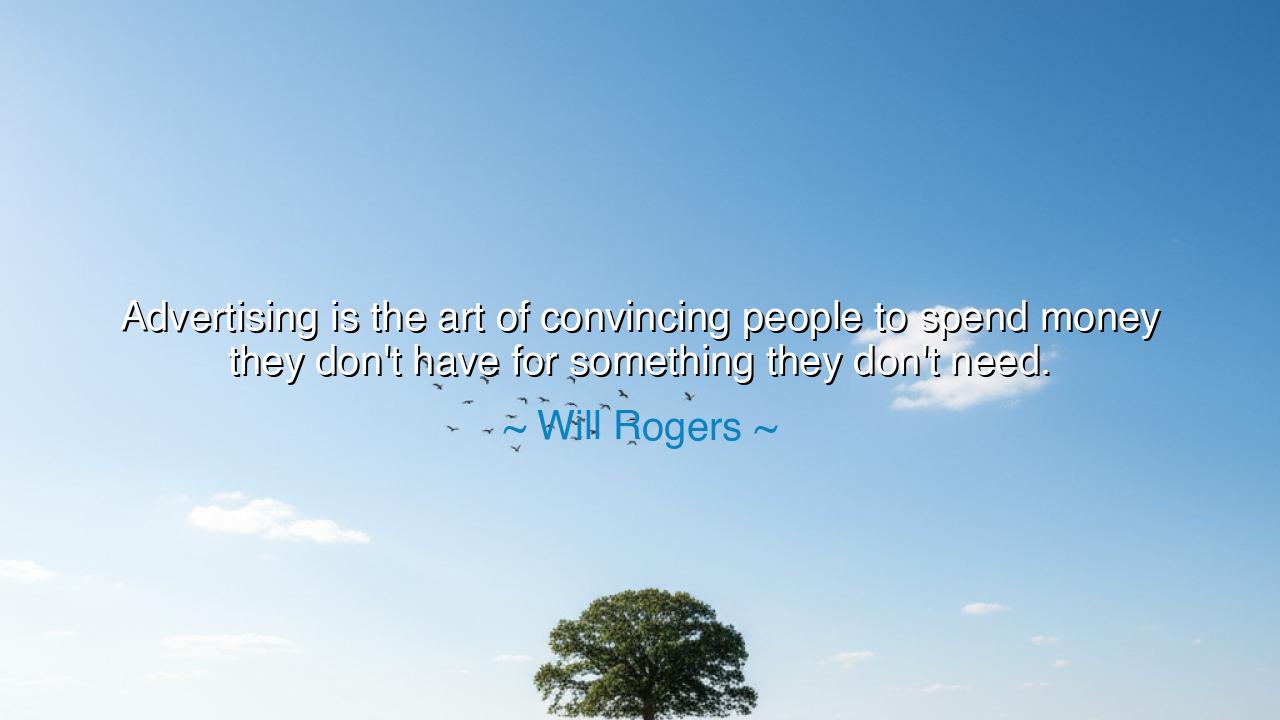
Advertising is the art of convincing people to spend money they
Advertising is the art of convincing people to spend money they don't have for something they don't need.






Host: The room is quiet, a reflective air filling the space as Jack and Jeeny sit with Will Rogers' words: "Advertising is the art of convincing people to spend money they don't have for something they don't need." Jack, with a thoughtful expression, looks up from the quote, clearly mulling over its implications, while Jeeny watches him, sensing the depth of the observation.
Jack: (his voice reflective) "Rogers has such a sharp perspective on advertising. It's like he’s pointing out how manipulative it can be. Advertising convinces people to spend money on things they don't need—often creating desires for products that are unnecessary. And it’s clever, because it plays on our insecurities, our desire for status, or even just the fear of missing out. It makes you wonder how much of what we buy is truly what we want versus what we’ve been convinced we want."
Jeeny: (nodding slowly, her voice calm) "Exactly. Advertising doesn’t just promote products—it creates a whole narrative around them. It convinces us that we need something when, in reality, we may be fine without it. Rogers is really calling out the manipulative nature of advertising, how it preys on our emotions and convinces us to make purchases that aren't necessary, all in the name of consumerism."
Jack: (pausing, his voice thoughtful) "What’s interesting is how advertising has evolved. It’s not just about selling a product anymore; it's about selling a lifestyle or an identity. Companies are no longer just pushing a physical product—they’re selling a vision, a version of ourselves we think we can become by buying into it. And it works, because we see those messages everywhere, all the time."
Jeeny: (smiling softly, her tone insightful) "Yes, it’s like advertising has become less about the product itself and more about the promise it offers. You don’t just buy a car—you buy freedom, status, adventure. You don’t buy a pair of shoes, you buy confidence. The products themselves may be secondary to the emotional response they trigger. And that’s where advertising really gets its power."
Host: The room feels quieter now, as both Jack and Jeeny reflect on the deeper implications of advertising in society. Will Rogers' words expose the subtle ways in which advertising shapes our desires, often convincing us to spend on things that don’t add true value to our lives. Jack looks out the window, contemplating how advertising has become so ingrained in everyday life, while Jeeny remains calm, a quiet understanding settling in the space between them.
Jack: (his voice gentler, almost revelatory) "It makes me think about how much we’ve been conditioned by advertising, how it’s everywhere—constantly reminding us that we need more, that we need the latest thing. We’ve come to accept it as normal, but it’s almost like advertising is crafting our desires, making us believe that happiness or fulfillment can be bought."
Jeeny: (nodding, her voice thoughtful) "Exactly. It’s not just about the product anymore—it’s about creating a need. And the thing is, these needs aren’t real. We’re taught to believe that our lives can only be complete with the next big thing, the newest gadget, or the most fashionable item. But in the end, most of those things don’t actually make us happier. It’s a cycle that keeps us chasing more, never quite feeling satisfied."
Host: The conversation lingers as Jack and Jeeny sit with the realization that advertising shapes not only what we buy but also how we feel about what we have. Will Rogers' quote cuts through the noise of consumer culture, urging us to pause and consider the true value of the things we’re convinced we need. The evening has settled outside, but the clarity of their thoughts continues to resonate in the quiet room.






AAdministratorAdministrator
Welcome, honored guests. Please leave a comment, we will respond soon